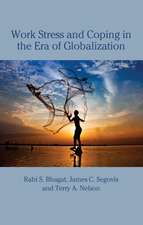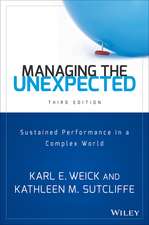Sensemaking in Organizations: Foundations for Organizational Science, cartea 3
Autor Karl E. Weicken Limba Engleză Paperback – 19 iul 1995
Din seria Foundations for Organizational Science
- 18%
 Preț: 927.69 lei
Preț: 927.69 lei - 22%
 Preț: 415.09 lei
Preț: 415.09 lei - 15%
 Preț: 553.49 lei
Preț: 553.49 lei - 18%
 Preț: 931.78 lei
Preț: 931.78 lei - 18%
 Preț: 1094.27 lei
Preț: 1094.27 lei - 18%
 Preț: 919.77 lei
Preț: 919.77 lei - 18%
 Preț: 716.25 lei
Preț: 716.25 lei - 15%
 Preț: 607.48 lei
Preț: 607.48 lei - 18%
 Preț: 839.36 lei
Preț: 839.36 lei - 18%
 Preț: 792.25 lei
Preț: 792.25 lei - 18%
 Preț: 790.20 lei
Preț: 790.20 lei - 18%
 Preț: 1212.59 lei
Preț: 1212.59 lei - 18%
 Preț: 794.14 lei
Preț: 794.14 lei - 18%
 Preț: 846.48 lei
Preț: 846.48 lei - 18%
 Preț: 926.12 lei
Preț: 926.12 lei - 18%
 Preț: 941.07 lei
Preț: 941.07 lei - 18%
 Preț: 725.71 lei
Preț: 725.71 lei - 18%
 Preț: 789.71 lei
Preț: 789.71 lei - 18%
 Preț: 716.42 lei
Preț: 716.42 lei - 18%
 Preț: 721.61 lei
Preț: 721.61 lei - 15%
 Preț: 405.98 lei
Preț: 405.98 lei
Preț: 840.96 lei
Preț vechi: 1025.56 lei
-18% Nou
Puncte Express: 1261
Preț estimativ în valută:
160.94€ • 167.40$ • 132.86£
160.94€ • 167.40$ • 132.86£
Carte tipărită la comandă
Livrare economică 12-26 aprilie
Preluare comenzi: 021 569.72.76
Specificații
ISBN-13: 9780803971776
ISBN-10: 080397177X
Pagini: 248
Dimensiuni: 152 x 229 x 16 mm
Greutate: 0.41 kg
Ediția:1
Editura: SAGE Publications
Colecția Sage Publications, Inc
Seria Foundations for Organizational Science
Locul publicării:Thousand Oaks, United States
ISBN-10: 080397177X
Pagini: 248
Dimensiuni: 152 x 229 x 16 mm
Greutate: 0.41 kg
Ediția:1
Editura: SAGE Publications
Colecția Sage Publications, Inc
Seria Foundations for Organizational Science
Locul publicării:Thousand Oaks, United States
Cuprins
The Nature of Sensemaking
Seven Properties of Sensemaking
Sensemaking in Organizations
Occasions for Sensemaking
The Substance of Sensemaking
Belief-Driven Processes of Sensemaking
Action-Driven Processes of Sensemaking
The Future of Sensemaking
Seven Properties of Sensemaking
Sensemaking in Organizations
Occasions for Sensemaking
The Substance of Sensemaking
Belief-Driven Processes of Sensemaking
Action-Driven Processes of Sensemaking
The Future of Sensemaking
Descriere
The teaching of organization theory and the conduct of organizational research have been dominated by a focus on decision-making and the concept of strategic rationality. However, the rational model ignores the inherent complexity and ambiguity of real-world organizations and their environments. In this landmark volume, Karl E Weick highlights how the `sensemaking' process shapes organizational structure and behaviour. The process is seen as the creation of reality as an ongoing accomplishment that takes form when people make retrospective sense of the situations in which they find themselves.




















